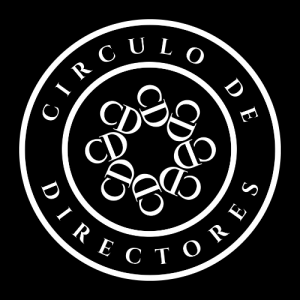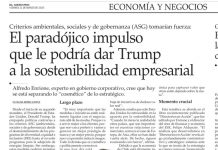 Fuente: Ethical Boardroom
Fuente: Ethical Boardroom
Autor: Cristina Ungureanu – Head of Corporate Governance, Eurizon Capital
The past two to three years have been extremely important for strengthening the relationship between investors and companies.
We have seen increased interest and constructive effort for company and shareholder engagement, particularly around ESG topics; and more activist investor intervention when shareholder engagement was absent or when the trust between investors and companies was weak.
We have seen the definition of corporate governance get broader and broader. While at the beginning it was seen as a way of enabling shareholders to be assured that their investments were being properly looked after, (i.e. the focus on internal controls and audit), the definition now talks about corporate governance – together with sustainability – being a means of fostering long-term growth and trust in business, contributing to more inclusive societies.
The concept of stewardship is aligned with corporate governance and sustainability and needs to be applied both ways: investors and companies. It is about looking at the long-term interests of the business. As steward investors, we have started to look past short-term profit, while expecting companies to take a longer term view of the health and sustainability of their business.
We continue to seek more communication and engagement around several priorities: overseeing competitive strategy in a world of disruption and convergence; enhancing risk management; navigating the dynamic geopolitical and regulatory environment; optimising long-term capital allocation strategies; embracing the workforce of the future; and strengthening board composition through strategic alignment.
New challenges, linked to new opportunities, have started to emerge – related to culture, social impact, disclosure and risks, and, with these, new responsibilities have been amplified for both investors and companies aligned.
Culture: an opportunity
Investors increasingly see the management of corporate culture as a critical element in the long-term sustainability of companies.
A board’s involvement in corporate culture entails two things: understanding and shaping the forces that drive behaviour within their organisation, and making themselves aware of their company’s social footprint.
In recent years, we have been talking about tone at the top when discussing board oversight and risk management. But now investors are asking boards: what is the tone at the bottom, what is the company culture, and are there any risks that stakeholders are taking that would put the company itself at risk? These are all new and challenging topics for leadership teams.
Investors recognise that an organisation’s chosen metrics of performance can affect organisational culture, values and behaviour. But we also acknowledge that the ‘quality’ of any organisation’s culture can affect the choice of performance metrics; it is a symbiotic relationship.
Remuneration: an opportunity
Remuneration is still a topic at the top of the investor agenda as the rewards landscape evolves. Investors will expect a complete change in approach by companies to one where remuneration is in tune with the company values and responsibilities to its wider stakeholders and societies in which it operates. Investors now expect to see ‘intangibles’, such as ESG, strong corporate culture and values, reflected in pay awards to executives.
For long, investors did not want discretion in pay, while now expecting to see ‘intangible’ aspects, such as ESG, corporate culture and values reflected in the awards to executives. Discretionary pay and long-term incentives payments should not be used as a mechanism for increasing total remuneration. Instead, companies are expected to start from the principle that exceptional pay should only be for exceptional performance.
Remuneration committees are expected to play a more active role in encouraging greater rigour around remuneration practices and overseeing the policy from a wider perspective. Investors also expect to see committees interacting with the human resources, risk and sustainability functions of the corporations as they show more consideration towards human capital and stakeholders’ interests.
Disclosure: an opportunity
Investors are seeking information that provides the confidence that management and boards of the investee companies are thinking long term. Our interest in more disclosure and interaction arises from the desire for improved performance, both from a financial perspective and in terms of overall corporate governance.
It is important not only that the board members are fully informed, but also that they can demonstrate to others that they are. Investors need to have comfort that the board has explored the full spectrum of risks the organisation has faced, that the right information has been supplied and the right questions asked.
For example, human capital management, increasingly seen by investors as material to long-term performance and risk mitigation, is also an important aspect of integrated business reporting that unifies financial and non-financial risk disclosures.
Investors have also acknowledged that climate change represents a significant economic shift following the Paris Agreement and we are growing impatient with companies that are not adequately disclosing how a two-degree Celsius future impacts their business, and how they will navigate the related risks and opportunities. Boards and senior management should ensure that climate risks are incorporated into strategic decision-making and that appropriate consideration is given to the need for disclosure of relevant financial-related risks.
Risk management: an opportunity
The disruptive forces that are bringing about a rethink of strategy are also rapidly changing the risk landscape and pushing companies to reconsider their approach to risk. In order to sustain growth and performance beyond 2020, companies need to apply a more balanced, agile and integrated approach to enterprise risk management.
Boards will need to confirm that management gives appropriate consideration to managing risk/return trade-offs to drive value creation. Boards are expected to apply a nuanced approach to risk management to support the realisation of opportunities associated with strategic risk-taking while minimising exposure to preventable and external risks, including ESG-related.
Board composition: an opportunity
Companies are responding to all this by undergoing a strategic rethink, while boards are increasingly coming under pressure from both the market and regulators in terms of effectiveness and accountability.
Investors continue to see boards’ role as decisive in ensuring that new challenges and expectations on how companies meet them are valorised and ensure they are effective and focussed on protecting the long-term sustainability of the business.
Board composition is fundamental to ensure board effectiveness. Aside from the importance of the concept of ‘independence’, which is paramount for investors contributing to the submission of candidates to the board, investors are increasingly scrutinising the ‘diversity’ of company boards. A board with members from diverse backgrounds is more likely to reflect the concerns of an increasingly global customer base and to reduce the risk of boards losing their connection with society as a whole when discussing issues like remuneration and social concerns.
Investors start seeing the value of a board succession procedure that enables potential candidates to be assessed on the basis of whether they would move the board closer to that ideal. In this context, board self-evaluation is an important tool to promote board succession. By looking at its strengths, a board can gain a better understanding of where it is currently putting its energy and determine if it has the right balance to deal with the issues and strategic concerns its organisation is facing.
On the other hand, investors themselves also play an important role in ensuring that boards are built for the future and are the right fit for each company’s strategy. We look to the evaluation process as an indication of board succession practices and governance proficiency. We expect boards to be transparent and proactive about the evaluation processes, to communicate and use the results.
For example, in Italy, the practice (recommended also by the Italian Corporate Governance Code) of current boards issuing guidelines on future board composition allows boards to measure and adjust their composition and strategy, while investors are able to gain confidence in the board’s preparedness for the future, getting a sense of its evolution.
Change in mindset
To achieve the opportunities of a sustainable future, investors and companies
are expected to have a change in mindset – be more forward-looking and place attention to the substance rather than the form. This all requires a long-term perspective on the purpose of each company, its finance, culture, values and corporate governance. By weaving a healthy corporate culture and governance into the business model, companies are not just contributing to the overall success of their own business but also creating an environment on which investors can rely. Investors can leverage this through stewardship; thus both companies and investors are geared to create sustained growth in the economy.
As long-term investors, collectively we need to think differently, because addressing sustainability aspects such as culture and values, human capital or climate change, is not only about what you stop doing but, more importantly, it is about what you start doing.












